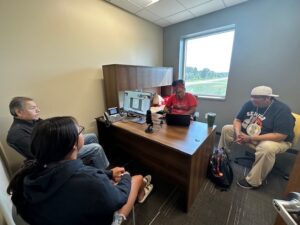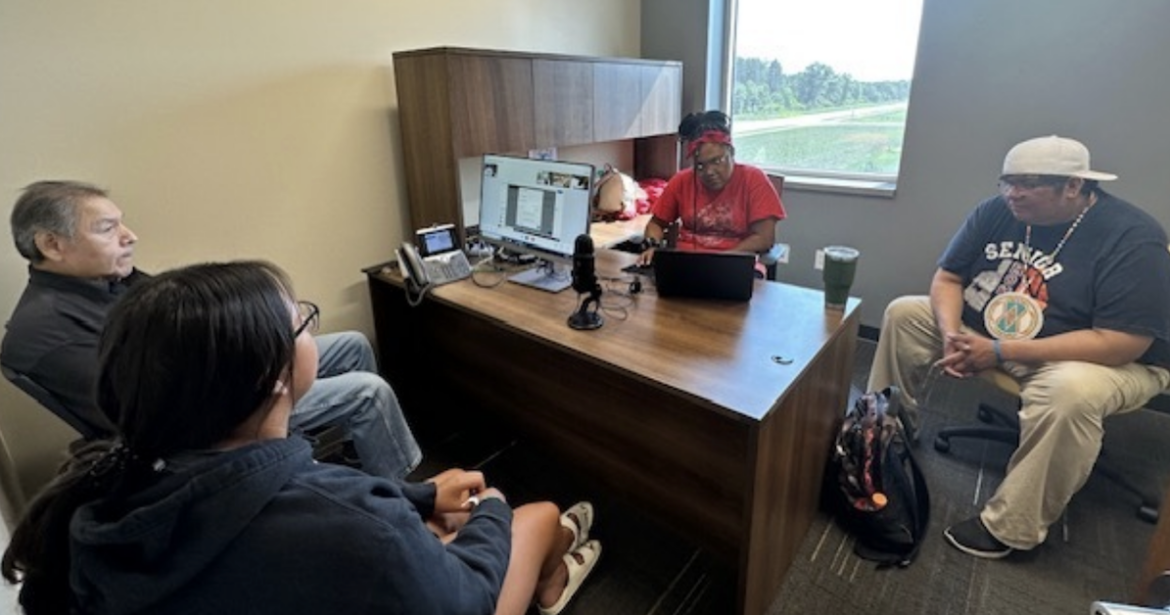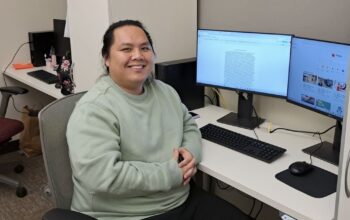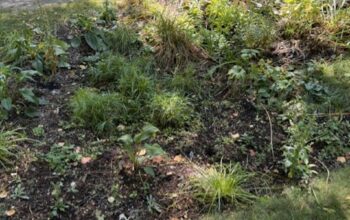A language is considered endangered when its fluent speakers are few, declining in number and increasing in age.
All of these qualities describe Hoocąk, the language of people belonging to the Ho-Chunk Nation, whose homeland encompasses the Madison area, due in part to the history of forced-assimilation initiatives like the residential school system. Today, the average fluent Hoocak speaker is a great-grandparent.
“The official number [of fluent speakers] is less than 50, and they’re all elders,” said Logan Mann, a Black River Falls sophomore enrolled in her high school’s Ho-Chunk language class.
This is a plight shared by Indigenous nations across North America, where 92% of living native languages are under threat of extinction. To keep Hoocąk alive for future generations, Mann is among a group of eight young people whose voices will be featured on the Ho-Chunk Nation of Wisconsin’s upcoming language-learning app.
The app is the second phase of a preservation project that began in 2020, in collaboration with the language-revitalization nonprofit the Language Conservancy and funded by an Administration for Native Americans grant. Phase one, an online Hoocąk dictionary with more than 10,000 words and sample pronunciations from tribal elders, debuted last year..
The Language Conservancy has created vocabulary-building apps in collaboration with other tribes, building online dictionaries with related lessons and exercises,
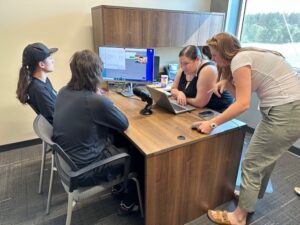
“Ours is going to be a little different, in that we’re not just vocabulary building, but we’re also doing the fundamentals of the language,” said Jessi Falcon, the education coordinator of the Ho-Chunk Nation’s Language Division.
The app’s creators took words and phrases from the Hoocąk curriculum taught in five south-central Wisconsin school districts and online, as well as the dictionary, to formulate the app’s linguistic capabilities.
“We had people develop sentences and content that we’d be putting into the app, and once those were all developed, we went in and added the audio, which is where the students come in,” said Hoocąk instructor Shena Munden, who teaches at Black River Falls High School. “We had them add the audio so that we could have younger voices on the app.”
The need for younger speakers is, of course, at the heart of the project.
These days, almost no one is “born into a household that’s speaking Hoocąk [as a first language],” said Chloris Lowe, who teaches Hoocąk in the American Indian & Indigenous Studies department at UW–Madison.
Those that were— today’s elders, the “eminent speakers”, have a key role in approving the linguistic content that will be available on the app.
“The elders are there to be our fact checkers — making sure we’re saying things correctly, making sure the sentences we have are grammatically correct and [are] things you would say in the language,” Munden said.
Mann said that participating in the app’s creation helped strengthen familial connections across generations.
“It really boosted my confidence in saying some words, because as a freshman, before I took Hoocąk, I couldn’t say some sounds or some words,” Mann said. “Doing the app, and doing it with my grandfather, Samson Falcon, really inspired me to learn more Hoocąk.”
Falcon (Jessi, that is) said that the app will involve a lot of matching activities like audio to text, text to image and image to audio. It will also include multiple-choice quizzes at the conclusion of each unit.
It will likely be named Hoit’e Woiperes — meaning “language” and “know” — and a beta version is planned to go out to Hoocąk instructors in December, with the final version’s release date scheduled for early in 2024.
“We, second-language learners, are products of our eminent speakers sharing the language with us. We in turn are teaching it in high school. We’re teaching it in the youth centers. The nation has another immersion day care now,” where young children are being taught Hoocąk, Falcon said. “For the eminent speakers to be able to see that we are passing the language on was, I hope, a source of pride for them, that their efforts are not for naught.”
